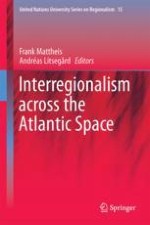2018 | OriginalPaper | Buchkapitel
9. Latin America’s Interregional Reconfiguration: The Beginning or the End of Latin America’s Continental Integration?
verfasst von : Paul Isbell, Kimberly Nolan García
Erschienen in: Interregionalism across the Atlantic Space
Aktivieren Sie unsere intelligente Suche, um passende Fachinhalte oder Patente zu finden.
Wählen Sie Textabschnitte aus um mit Künstlicher Intelligenz passenden Patente zu finden. powered by
Markieren Sie Textabschnitte, um KI-gestützt weitere passende Inhalte zu finden. powered by
